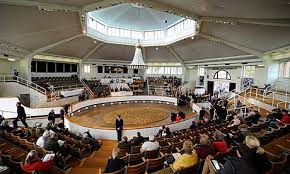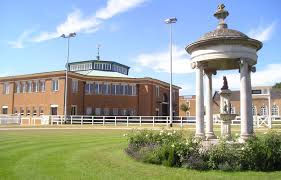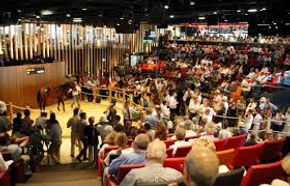
Title. Double click me.
A GUIDE TO THE SALES:
Horse sales can be an intimidating place but they all work essentially the same way. First you have to decide if you want to bid for the horse yourself or employ the services of an agent. Doing it yourself will be cheaper, there are no agent fees on top of the sales company commission but unless you do it by phone or internet, other people can see who they are bidding against. Sometimes that makes them keener or they may use a strategy to out bid you. Agents will cost money but they keep the bidding relatively anonymous and they can do all the donkey work narrowing down your list of potential purchases to one or two worth bidding on. Also they will not get carried away in a bidding war!! Make sure you agree, preferably in writing, exactly what terms you are employing your agent under before the sale start. Bloodstock agents do not need a license so you have little way of complaining if you make a mistake. But most agents are quite reputable and any sales company can direct you to the local ones if you are unsure.
Either you or the agent must register with the sales company before you bid and establish a line of credit. Then, when you have won your horse, a sales employee will come and find you (if your identity is not well known to the auctioneers) and get you to sign the sales docket which essentially binds you to pay for the animal you bid on. Agents will take care of all these details.
Regardless of whether they are foals, mares, horses in training (HIT) or yearlings, the horses will arrive at the sales arena usually a couple of days before they are due to go through the ring. Some of the sales are huge and take up to two weeks to complete so the sales catalogue will be several volumes large, each volume known as a 'book'. So for example Tattersalls October Yearling Sale lasts for six days and has four 'books'. This means that there are a lot of pages (pedigrees) for you to consider. An agent will go through the entire catalogue for you, with your budget and other needs in mind and make you a short list, which you can either leave to them to visit in person or you can go together.
Before you bid, if you like an animal it is best to get it checked over by a veterinarian before hand. This will be at your expense but auctions are conducted on a sold as seen basis, so with one or two exceptions for certain ailments, if you bid for a horse you are obliged to take it home even if you then discover it has a club foot or one leg is shorter than the other three! These days the sales companies often have a 'repository' where x-ray images and video of scope examinations of the windpipe can be viewed. This is to save the horses from constant veterinary examination and works well. Your vet would go and look at these and advise you either to continue or to proceed with more detailed examinations.
You may see the horse as many times as you wish, almost until the last second it goes through the sales ring. Never be afraid to ask for another look, for some people this is a massive investment and you need to be sure. The horses can even be pulled out of the pre sale 'collecting ring' to be looked at if you wish. There is another viewing opportunity if you are buying an unraced two year old at what is known as a 'Breeze Up' sale. This was an American idea where each two year old would work in front of any potential purchaser, 'breezing' the last two furlongs which are timed. Breezing is the American term for a piece of fast work. Those sales often coincide with race meetings, where the horses breeze on the course in the morning, then there is racing and then the horses are sold that evening or the following one. Most other types of Throughbred sale though, do not give a buyer a chance to see a horse working before purchase.
As soon as you have purchased your horse, either you or your agent must arrange for its transport home. All the transport firms have agents in place at a sale and really is only a matter of giving them the lot number and the address it is travelling to. They will generally work out which horses are going where and get a load together which will reduce your cost. You are of course, perfectly entitled to arrange private transport or pick the horse up yourself, but do bear in mind that unless you are buying on the last day, you will need to move quickly as the stable will be needed for another resident. If the sales company has to move the horse to a holding yard, you will be charged for this.


TATTERSALLS AUCTION HOUSE - NEWMARKET


BBAG AUCTION HOUSE - BADEN - BADEN
ARQANA AUCTION HOUSE - DEAUVILLE
